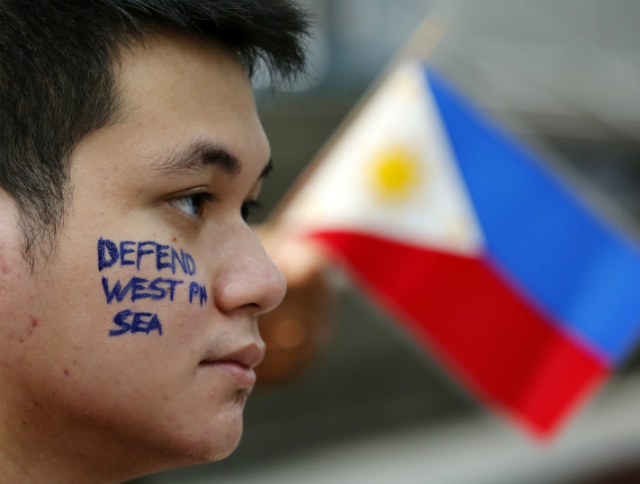The historic case in The Hague goes beyond the right to fish in the disputed West Philippine Sea (South China Sea)

'DEFEND THE SEA.' A Filipino joins a demonstration in front of the Chinese consular office in Makati City on June 10, 2016, ahead of a historic ruling on the West Philippine Sea (South China Sea). Photo by Francis Malasig/EPA
"It is about defending what is legitimately ours. It is about securing our children's future."
These words of then Philippine Foreign Secretary Albert del Rosario resound on Tuesday, July 12, as Filipinos expect a victory against China in a historic case over the West Philippine Sea (South China Sea).
The Permanent Court of Arbitration in The Hague, Netherlands, is set to announce an arbitral tribunal’s ruling on the case at 5 pm on Tuesday, Philippine time. (READ: CHEAT SHEET: What you need to know about PH-China case)
At stake in this case is the right to fish – and to explore and exploit oil and other resources – in the West Philippine Sea.
For the Philippines, the core issue involves its exclusive economic zone (EEZ).
The EEZ is an area 200 nautical miles from a coastal state’s baselines or "edges." Within this EEZ, the state has the exclusive rights to explore and exploit marine resources.
This rule on the EEZ is enshrined in the United Nations Convention on the Law of the Sea (UNCLOS). Experts call this the "Constitution for the Oceans."
'80% of fish' at stake
The problem for the Philippines is, China is claiming waters within a so-called 9-dash line. This U-shaped line covers practically the whole West Philippine Sea.
China’s 9-dash line overlaps with the Philippines’ EEZ.
The Philippines claims that this 9-dash line is baseless under UNCLOS.
The Philippines, then, is urging the tribunal in The Hague to strike down China’s 9-dash line. (READ: Rough seas: Will PH 'lawfare' work vs China?)
"The issue here is whether the Philippines will keep 80% of its exclusive economic zone in the South China Sea, or we lose it to China," Senior Associate Justice Antonio Carpio of the Philippine Supreme Court said in July 2015.
"If we lose 80% of our EEZ in the South China Sea, that means we lose 80% of the fish we catch annually in the South China Sea," Carpio added.
The case, however, goes beyond debates over the right to fish.
Wider than the sea
“This is a matter of wider significance than the South China Sea,” Singaporean ambassador-at-large Bilahari Kausikan said, as quoted by the New York Times.
"The importance of the issue is whether international rules will be obeyed," Kausikan added. He pointed out that China "cannot pick and choose which rules to follow or only comply when convenient."
China, after all, has denounced the arbitral proceedings. The Asia Maritime Transparency Initiative says at least 10 mostly African countries have publicly supported Beijing in rejecting any ruling.
On the other hand, at least 40 other countries, including the US and the UK, support the upcoming ruling as legally binding.
Beyond EEZs, then, this is the wider issue at stake: whether China, the giant of Asia, will heed the rule of law and ensure peace in the region.
[Video: Rappler Talk: Making China follow the rule of law
The words of Del Rosario on March 30, 2014, when the Philippines submitted its written pleading in the case, still ring true when it comes to this bigger issue.
The case, Del Rosario said, is also "about guaranteeing freedom of navigation for all nations."
"It is about helping to preserve regional peace, security and stability," he continued.
"And finally, it is about seeking not just any kind of resolution, but a just and durable solution grounded on international law."
http://www.rappler.com/nation/139409-philippines-china-sea-case-hague-ruling-issues

No comments:
Post a Comment
Note: Only a member of this blog may post a comment.